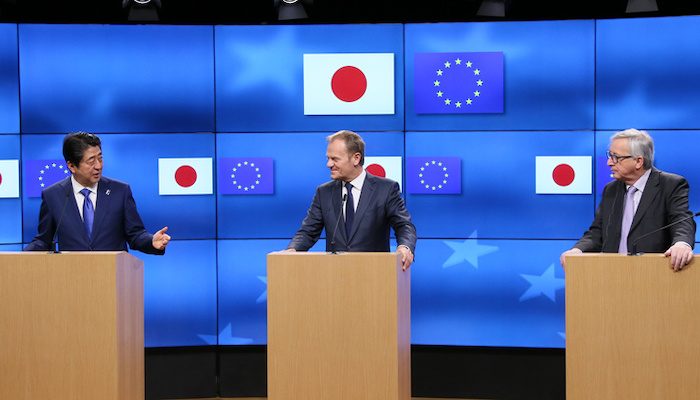
The EU-Japan Partnership in Shadow of China: The Crisis of Liberalism
Edited by Axel Berkofsky, Christopher W. Hughes, Paul Midford and Marie Soderberg
Routledge, 2017
Traditionally, the topic of EU-Japan relations and, as a result, the associated scholarship have been something of an afterthought. Attention has understandably and predominantly been placed on relations with the US hegemon, and to a lesser extent other important and emerging relationships, such as China, India and Australia. Once upon a time, the work of Endymion Wilkinson and Julie Gilson stood out as the ‘go-to’ works on how Europe and Japan engaged with each other historically and after the end of the Cold War.
However, both events and scholarship have recently moved on. On the one hand, earlier this year we saw the EU-Japan Economic Partnership Agreement come into force. On the other hand, a number of valuable contributions have steadily augmented our understanding of this evolving relationship, including collections edited by Kirchner and Dorussen (2018), Vanoverbeke et al. (2017) and Bacon, Mayer and Nakamura (2015), as well as research monographs like Frattolillo (2016). This collection of essays, edited by a group of well-regarded scholars of Japan’s role in the world, is a welcome addition.
In turn, the chapters presented here cover a range of developments in EU-Japan relations ‘across the dimensions of trade, finance, development assistance, and traditional and non-traditional security’ (p. 1). What binds these various essays together is a focus on the uncertain international environment captured by the rise of China, as highlighted in the sub-title of this book, but equally epitomized by the rise of populism and illiberalism as seen in the election of US President and former reality TV star Donald J. Trump and the slow-motion car crash that is Brexit.
Either through the individual chapters, or as a sum of its parts, this volume contributes to our understanding of recent developments. Stand-out contributions include Paul Bacon and Hidetoshi Nakamura’s chapter on how debates surrounding security identities within the EU are relevant to similar debates now taking place in Japan. It is one of the most topical and relevant contributions in light of Japan’s rapidly evolving security posture under the Abe administration. Christopher Hughes’s chapter on EU-Japanese cooperation in defence production represents another incremental contribution to a developing trend that is likely to become much more important in the future. The Chinamerican ripostes from the perspectives of the contemporary superpowers provided by Lilei Song, Liang Cai and Jeffrey Hornung constitute welcome external perspectives on the EU-Japan relationship that serve to single this book out from its competitors. It is also particularly encouraging to see a concluding chapter tie these contributions together. It never ceases to surprise that a concluding chapter to an edited collection of essays is still something that editors often overlook.
The overarching argument presented here is that ‘[i]t might now indeed be possible to see a new dawn for Tokyo and Brussels’ joint achievements in international trade, politics and security. However, … EU-Japan cooperation is not yet demonstrating its full capability to lead effectively in these areas and cooperation gaps are likely to remain. There is also a disturbing lack of urgency in Brussels and Tokyo in fully responding to the daunting challenges they face’ (p. 14). Upon completing and putting the book down, this reviewer was slightly uncertain as to how he should feel. On the one hand, encouraged that the potential of EU-Japan relations that has long been hinted at is now demonstrating some momentum and forward motion into areas previously untouched within the relationship. On the other hand, a sense of déjà vu combined with resignation that this much heralded potential will lose out once again to relations with a dominant hegemon and the pressures of the international structure. We have seen this happen in the past and it would not be surprising to see a similar book being published with similar warnings ten years from now.
So, in many ways this is a sobering read for sobering times. However, putting this pessimism to one side, the organisers of the workshop on which this book is originally based and subsequent editors of this volume have done an admirable job of assembling a range of contributors who are diverse in terms of background, nationality, gender, discipline, career stage and so on. The editors have done a fine job of maintaining the range of voices and teasing out the benefits of this diversity while ensuring coherence across the contributions.
This book will command a wide readership across a range of audiences. Researchers, whether they are early-career or established scholars as well as final-year undergraduate and postgraduate students across a range of disciplines, will find information and analysis relevant to their interests in Japan’s evolving foreign policy stance and response to the rise of China and the uncertainty engendered by populism. At the same time, policymakers and practitioners will benefit from the up-to-date information and perspectives presented in this book.
My only criticisms are minor in nature. First, the publisher should consider a paperback edition of the book so as to increase readership. Second, and inevitably, a few typos remain despite the undoubtedly rigorous editing and proofreading processes (for example, different angles not angels, p. xi). Third, there is an equally inevitable unevenness in the quality of some of the chapters. This is very much the nature of the beast when it comes to edited volumes and does not detract from a welcome contribution to the field.